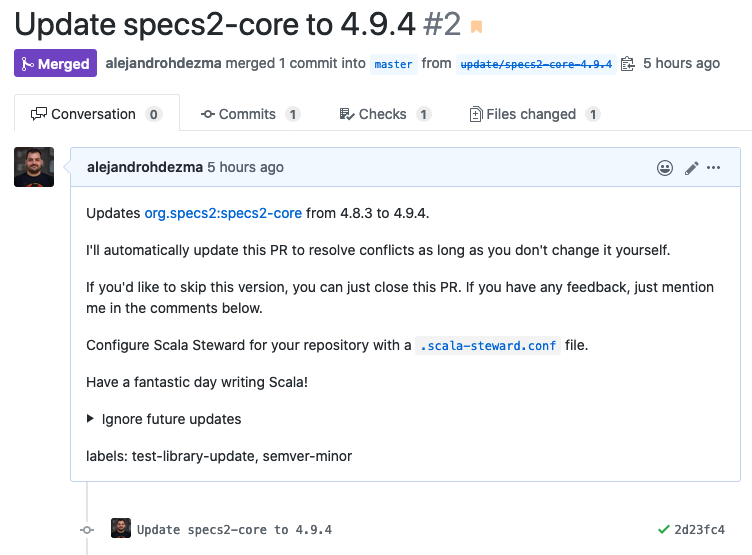A Github Action to launch Scala Steward in your repository.
When added, this action will launch Scala Steward on your own repository and create PRs to update your Scala dependencies using your own user:
Create a new .github/workflows/scala-steward.yml file:
# This workflow will launch at 00:00 every Sunday
on:
schedule:
- cron: '0 0 * * 0'
jobs:
scala-steward:
runs-on: ubuntu-latest
name: Launch Scala Steward
steps:
- name: Launch Scala Steward
uses: scala-steward-org/scala-steward-action@v2
with:
github-token: ${{ secrets.ADMIN_GITHUB_TOKEN }}If you want to be able to trigger the action manually, you make it respond to repository_dispatch events:
on:
schedule:
- cron: '0 0 * * 0'
repository_dispatch:
types: [scala-steward]Then, you can call the trigger from your local machine with:
# Change `owner/repo` to your own repository
curl -d "{\"event_type\": \"scala-steward\"}" \
-H "Content-Type: application/json" \
-H "Authorization: token ${GITHUB_TOKEN}" \
"https://api.github.com/repos/owner/repo/dispatches"Remember to have a valid github token exported as GITHUB_TOKEN in your local environment:
export GITHUB_TOKEN="your_github_token"
The following inputs are available:
| Input | Allowed values | Required | Default | Description |
|---|---|---|---|---|
repos-file |
File paths | no | '' | Path to a file containing the list of repositories to update in markdown format (- owner/repo) |
github-repository |
{{owner}}/{{repo}} | no | $GITHUB_REPOSITORY | Repository to update. The current repository will be used by default |
github-token |
Valid Github Token | yes | '' | Github Personal Access Token with permission to create branches on repo |
author-email |
Email address | no | Github user's Public email | Author email address to use in commits |
author-name |
String | no | Github user's Name | Author name to use in commits |
scala-steward-version |
Valid Scala Steward's version | no | 0.6.0 | Scala Steward version to use |
ignore-opts-files |
true/false | no | true | Whether to ignore "opts" files (such as .jvmopts or .sbtopts) when found on repositories or not |
sign-commits |
true/false | no | false | Whether to sign commits or not |
If you would like to specify a specific Java version (e.g Java 11) please add the following step before Launch Scala Steward:
- name: Set up JDK 11
uses: actions/setup-java@v1.3.0
with:
java-version: 1.11
- You will need to generate a Github Personal Access Token with permissions for reading/writing in the repository/repositories you wish to update.
- Add it as a secret repository.
- Provide it to the action using
github-tokeninput:
- name: Launch Scala Steward
uses: scala-steward-org/scala-steward-action@v2
with:
github-token: ${{ secrets.ADMIN_GITHUB_TOKEN }}The Github Personal Access Token can be created under your own Github user account, or under a separate account that has Collaborator permission in the repository/repositories you wish to update.
Make sure the account you choose has Name and Public email fields defined in Public Profile -- they will be using by Scala Steward to make commits. If the account has personal email address protection enabled, then you will need to explicitly specify a email to use in commits:
- name: Launch Scala Steward
uses: scala-steward-org/scala-steward-action@v2
with:
github-token: ${{ secrets.ADMIN_GITHUB_TOKEN }}
author-email: 12345+octocat@users.noreply.github.comTo update only one repository we can use the github-repository input. Just set it to the name (owner/repo) of the repository you would like to update.
- name: Launch Scala Steward
uses: scala-steward-org/scala-steward-action@v2
with:
github-token: ${{ secrets.ADMIN_GITHUB_TOKEN }}
github-repository: owner/repositoryThis input isn't required if the workflow launches from the same repository that you wish to update.
To update multiple repositories you would need to perform the following steps:
-
Create a markdown file containing the list of repositories in markdown format:
# repos.md - owner/repo_1 - owner/repo_2
-
Put that file inside the repository directory (so it is accessible to Scala Steward's action).
-
Provide it to the action using
repos-file:# Need to checkout to read the markdown file - uses: actions/checkout@v2 - name: Launch Scala Steward uses: scala-steward-org/scala-steward-action@v2 with: github-token: ${{ secrets.ADMIN_GITHUB_TOKEN }} repos-file: 'repos.md'
This input (if present) will always take precedence over
github-repository.
If you want commits created by Scala Steward to be automatically signed with a GPG key, follow this steps:
-
Generate a new GPG key following Github's own tutorial.
-
Add your new GPG key to your user's Github account following Github's own tutorial.
-
Export the GPG private key as an ASCII armored version to your clipboard (change
joe@foo.barwith your key email address):# macOS gpg --armor --export-secret-key joe@foo.bar | pbcopy # Ubuntu (assuming GNU base64) gpg --armor --export-secret-key joe@foo.bar -w0 | xclip # Arch gpg --armor --export-secret-key joe@foo.bar | sed -z 's;\n;;g' | xclip -selection clipboard -i # FreeBSD (assuming BSD base64) gpg --armor --export-secret-key joe@foo.bar | xclip
-
Paste your clipboard as a new
GPG_PRIVATE_KEYrepository secret. -
If the key is passphrase protected, add the passphrase as another repository secret called
GPG_PASSPHRASE. -
Import it to the workflow using an action such us crazy-max/ghaction-import-gpg:
- name: Import GPG key uses: crazy-max/ghaction-import-gpg@v2 with: git_user_signingkey: true env: GPG_PRIVATE_KEY: ${{ secrets.GPG_PRIVATE_KEY }} PASSPHRASE: ${{ secrets.GPG_PASSPHRASE }}
-
Tell Scala Steward to sign commits using the
sign-commitsinput:- name: Launch Scala Steward uses: scala-steward-org/scala-steward-action@v2 with: github-token: ${{ secrets.ADMIN_GITHUB_TOKEN }} sign-commits: true
-
Optional. By default, Scala Steward will use the email/name of the user that created the token added in
github-token, if you want to override that behavior, you can useauthor-email/author-nameinputs, for example with the values extracted from the imported private key:- name: Launch Scala Steward uses: scala-steward-org/scala-steward-action@v2 with: github-token: ${{ secrets.ADMIN_GITHUB_TOKEN }} sign-commits: true author-email: ${{ steps.import_gpg.outputs.email }} author-name: ${{ steps.import_gpg.outputs.name }}
By default, Scala Steward will ignore "opts" files (such as .jvmopts or .sbtopts) when found on repositories, if you want to disable this feature, use the ignore-opts-files input:
- name: Launch Scala Steward
uses: scala-steward-org/scala-steward-action@v2
with:
github-token: ${{ secrets.ADMIN_GITHUB_TOKEN }}
ignore-opts-files: falseAll the credit goes to fthomas for creating such an awesome tool as Scala Steward
Scala Steward Action is licensed under the Apache License, Version 2.0.


